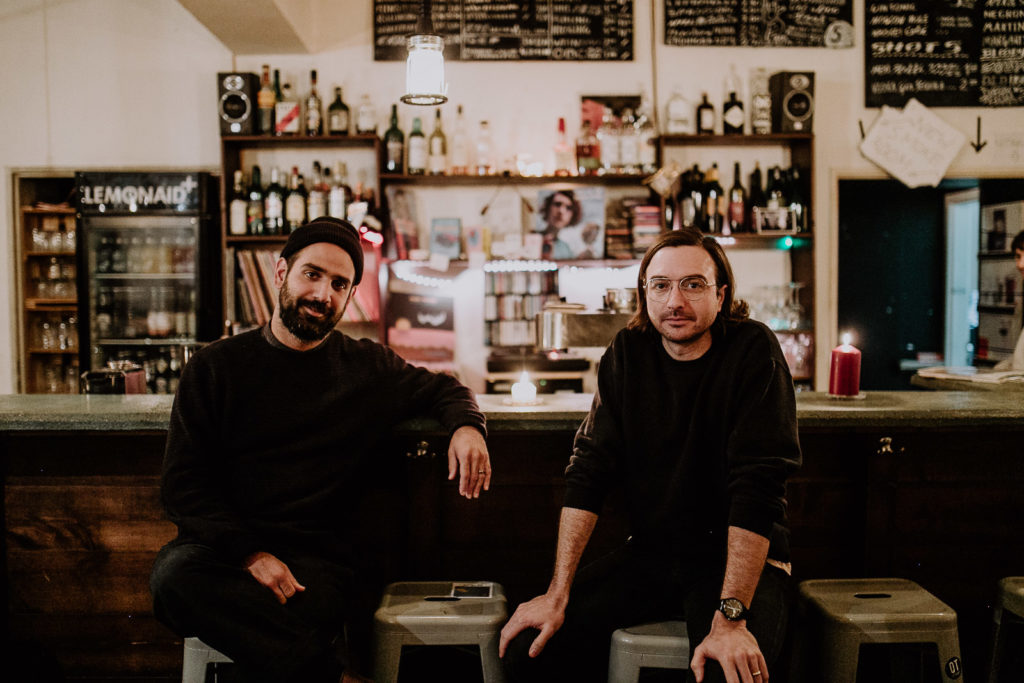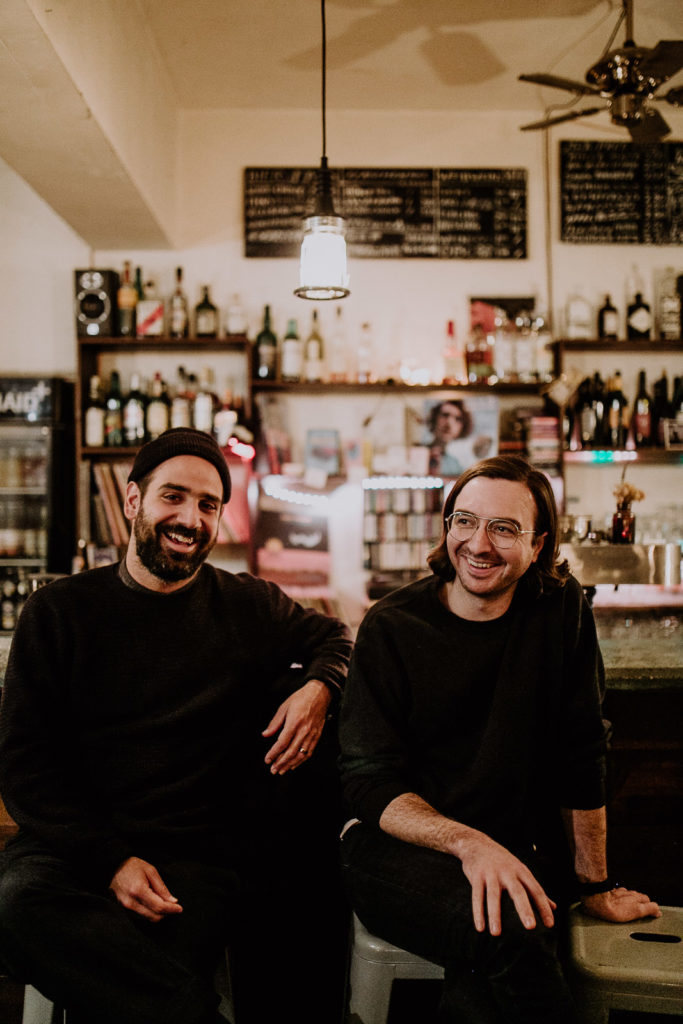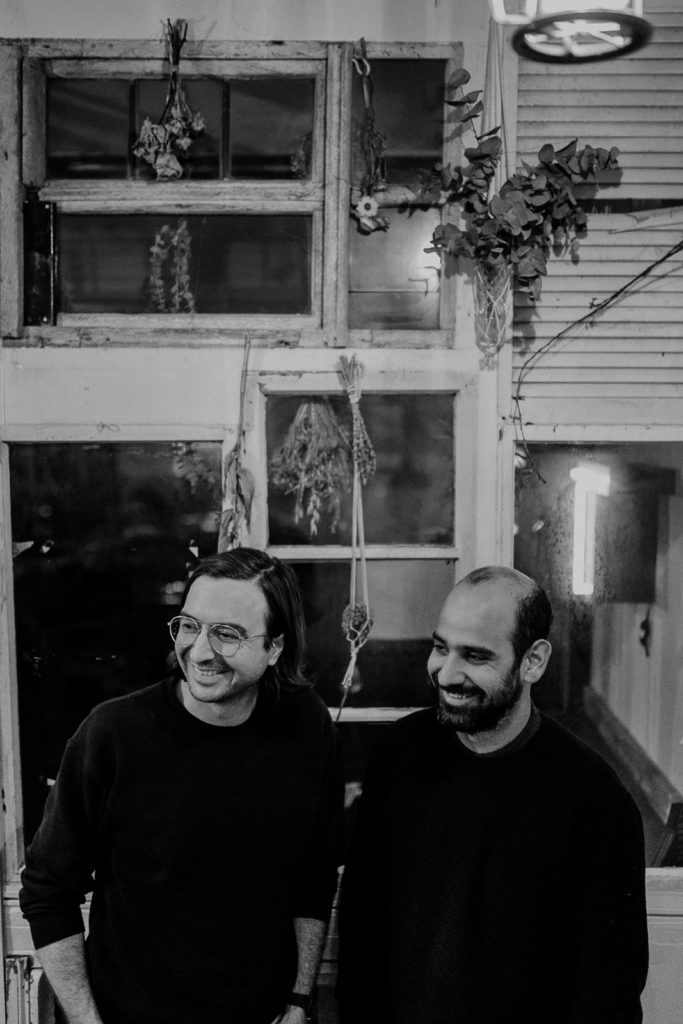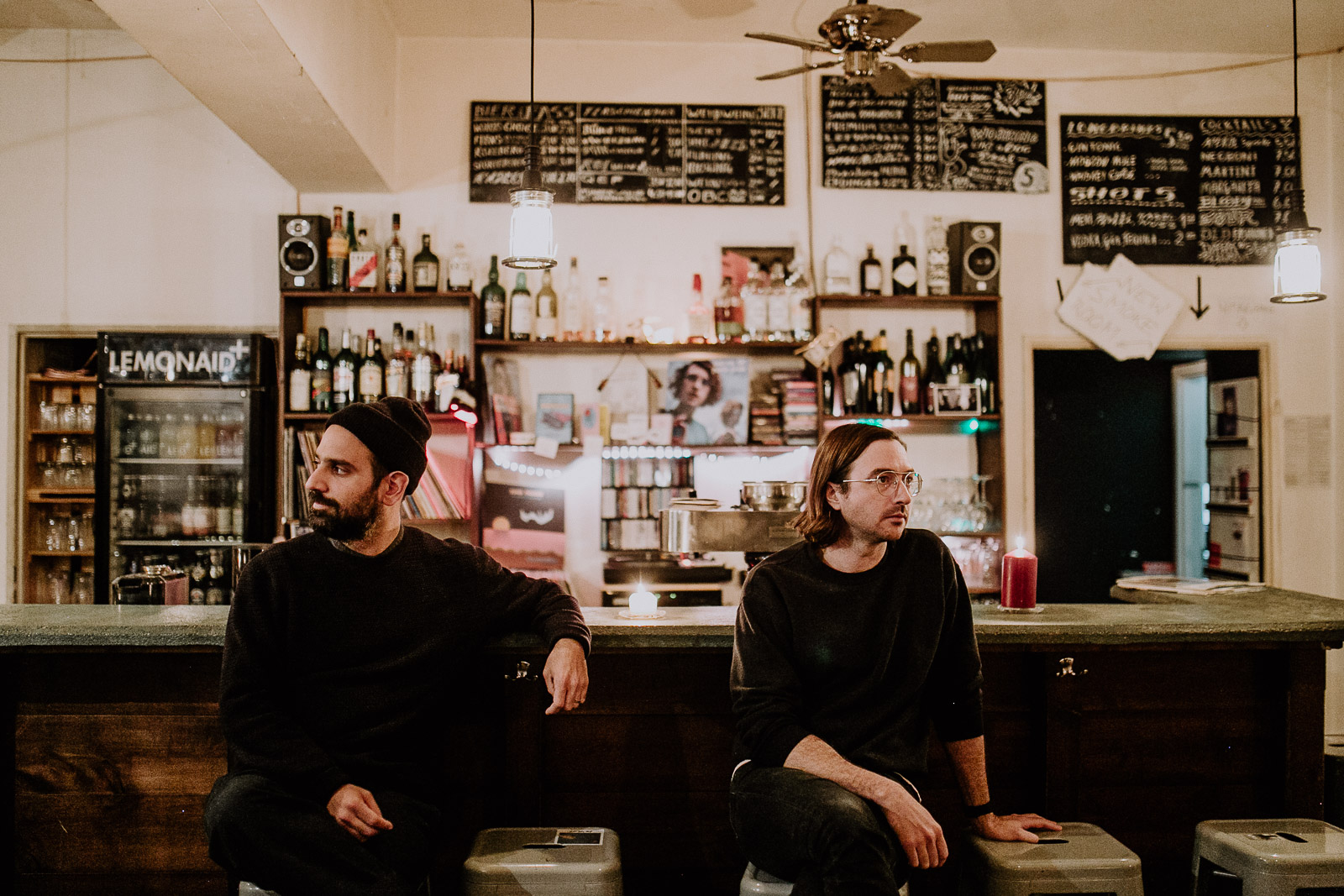Foto-© Michèle Hilbert
Nach über zehn Jahren Bandgeschichte veröffentlichen Real Estate am Freitag ihr fünftes Album The Main Thing. Bekannt geworden sind sie Amerikaner für ihre melodischen Indierocksongs. Für die neue Platte haben sie einmal alles in Frage gestellt, sich und ihre Ideen neu sortiert, die Recording Sessions für KünstlerInnen von außen geöffnet und sich Zeit zum Ausprobieren gegönnt. Damit ist in dem sonst so cleanen Sound der Band ein bisschen Chaos eingezogen.
Wir haben Frontmann Martin Courtney und Gitarrist Alex Bleeker Ende Januar in Berlin getroffen. Im Gespräch wird deutlich, wie detailliert sich die Band mit jedem Detail ihres Sounds auseinandersetzt und dass sie lässig genug sind, auch über Unsicherheiten zu sprechen. Im Interview erzählen sie, warum auch etablierte Bands sich immer wieder die Sinnfrage stellen (sollten), wie ihr Produzent Kevin McMahon sie immer wieder aus ihrer Komfortzone gepusht hat und warum es keine Abkürzung auf dem Weg zu einem guten Album gibt.

Congratulations on your new album The Main Thing! Real Estate has been making music for over a decade now — do you consider yourself an established act with routines etc. or is everything still exciting?
Alex: That’s the whole thing with this album for us. It feels like a double-edged sword. It does feel like we’re an established band, which is amazing and we’re grateful for it. You can get comfortable in that position. At the same time, making this new record, we were trying not to get too comfortable and not to do something that was completely routine. We wanted to make a new record, but we didn’t want to repeat ourselves. We had to ask ourselves, what’s the point in putting out your fifth album? It was challenging and anxiety inducing and there was a lot of fear. But now, that we’re on the other side of it, we’re really proud of what we did. We feel like we became established and that can be an incredible thing, but it can also make you feel insecure. There’s a lot of excitement for new bands and new music. It happened a couple of times that people said, “Real Estate, I used to love you”. They don’t mean it like that, but it always stings a little bit. You’re associated with a certain time.
Martin: There’s a fear of losing relevance. The music industry moves so quickly, and you feel very old in your early or mid-30s.
Alex: We were the youngest new kids and that wasn’t that long ago!
Martin: The temptation is there to think about what made us popular in the first place. The scarier thing to do is to go away from that. Not to avoid it, but to analyze the choices you’re making.
So, the anxiety of having to prove yourself as a young band is now replaced with the anxiety to disappoint?
Alex: You don’t want to admit that, but sure. It’s twofold: You do it for yourself, because we discovered with this album that the only point of making another record is to do the best you can to get something that you can get behind and that is transcendent for you and that you’re proud of. But we don’t claim to be totally self-indulgent. Of course, you want the people who followed you and put their trust in you to still like you and you also want to attract new people to like the band. Quite candidly, it’s a self-imposed pressure to be good. But also, great albums and artists, they are enjoyed collectively, so you think about other people.
When you’re writing new music, do your re-visit your old work or do you start fresh?
Martin: We tried to start fresh. I don’t really re-visit our old records anyway, it’s hard to listen to you own music. But we were thinking, where we’ve been and taking cues from the past and learning lessons from decisions that we’ve made.

I read that for The Main Thing, you as a band had an evolution, where each member experimented in new roles. Was that a conscious part of leaving behind old routines or did it just happen naturally?
Martin: I think it just happened, but it happened, because we were stopping to try and think about what we’re doing. There was a lot of pushing each other. Kevin [McMahon], our producer, was like a 6th member of the band when we were making this record and he also pushed us really hard. Down to a granular level, we analyzed each other and what we were doing. For example, Jackson [Pollis], our drummer, worked very closely with our keyboard player Matt [Kallman] to find the coolest sounds to complement the songs or to be unexpected. Just things like that…
Alex: In a band you get to know each other a little better each year and not everybody has been in the band for the same amount of time. For Julian [Lynch] – we’ve known him for a long time – this is the second record with the band. I can only imagine that he was feeling much more comfortable and it shows. His parts are so well-considered, his tones are particularly thought over and he wrote a song for band for the first time.
Martin: His solos are very confident, too.
Alex: Yes, that changes the band as well and the collaborative space, when we get into the studio together.
In addition to challenging your own positions inside the band, you also worked with people from the outside for the first time.
Alex: That was all about the same thing we’ve been talking about. These are things that we’ve never done before that we should start doing in order to continue to have a vitality. You get to a certain point down the road, where it’s been cool to have the sounds produced by the chore members of the band each time. Now that we’ve got to do something different, we were thinking of who in our community that we value and respect, we could bring in and what they could do with the songs.
Martin: Kevin pushed us toward that. He was championing the idea for a while and we were pretty resistant to it. We were whispering to each other, “He wants us to work with other people… This feels weird…”, and we were protective about the thing that we were making. You’re worried that the five of you created something and then someone comes in and does something to it, you don’t like.
Alex: But every good producer sees the big picture in a way, and he could see it, before we could see it. It’s like the metaphor of the painter being too close to their canvas that they can’t see it: Having someone, who can step back and see that we needed an infusion of some new energy. And pretty much every good band I can think of does that in one way or another.
Martin: The key to feeling good about it was working with people who we respected and trusted. Whether or not we knew them personally.

Of course, it’s easier to give up control, if you trust the other person.
Martin: Exactly. And we still had control, we didn’t have to use it. What was exciting about it was also not dictating what we wanted out of whoever it was and just being surprised and pleased with the results.
How would you describe the evolution of your sound after all these changes?
Alex: There are new rhythms that we’ve worked with. There are different kinds of beats that change the way that the songs feel. There are new instruments such as strings that we’ve never used before. There are some other people, who played some auxiliary percussion and it’s treated in the production in a way that it sounds quite grand. We are a band that was very dear to our subtlety before and we’ve made some choices that are actually not so subtle. Somebody might laugh and still find it quite subtle, but to us…
Martin: Oh my God, yeah!
Alex: We have a reputation for being a very chilled band and with the subject matter of the record and the music that accompanies it, it becomes very clear that we’re not feeling like it’s a very chilled time and we’re not feeling very chilled about things. We’ve felt that way for a long time, but it didn’t seem to come across to a lot of fans, but this time, it’s up there on the surface.
Martin: Thematically, this record reflects the anxiety that we’re feeling in this world from a more personal perspective. Sonically, I think of this record as a reflection of this world we are in. It’s a messier, noisier, more chaotic record while still being hyper melodic. That’s the music that we like to make, but we tried to keep it interesting with a bit of experimentation.
Would you say that the motif of the record is a duality between new angles and old strengths like the clash between the melodic style and more chaotic elements?
Martin: I think that every record that you make is a reaction to the one before it. When we made With In My Mind, I was really into Steely Dan and super clean production. We were also known for being kind of spacey and these cliché descriptions of us that seemed to re-occur. So, we thought it would be cool to have a tight drum sound and make a record that felt like thematically sealed. Which is funny, because this record is much more open and outward looking. I think, as a reaction to the cleanness of the last record, we’ve made a messier sounding record. Even before we knew anything about this record, I was envisioning it that way. I was hoping, it would feel a bit less controlled.
Alex: It’s one of the things that we pushed ourselves to get out of. We’ve been a band that prides itself on this tight pop structure. We’re trying new things from elements of music that we all like personally but haven’t necessarily implemented into our band fully yet. For example, Julian wrote a song for this record and there’s an open improvised section of it. There was no set amount of times we were going to do this before we stopped. We took takes in the studio improvising together, allowing ourselves to take what felt like risks to us, paid off musically.

That sounds like a complex process, you have been recording over the course of a year. That’s a privilege you as an established band have at last.
Alex: It’s almost that you only get two times to do it. For your first album, you have your whole life and if you become more established and you have the support of a label, a good one will let you take the time that you need to make the best album possible. We almost pushed back against the people, who worked around us, because we wanted to get our music back out there, we wanted to get back on the road and keep working. It was a learning process. With the previous record, it was much more streamline, we had one studio session and we got all the tracking done. And this was several full band sessions, smaller sessions… I can’t even tell you how many mixes we have for certain songs. For this kind of record, we wanted to be measured and consistent. There are records, where you plug straight into the amp, turn the microphone on and that’s raw and that’s cool – Neil Young style. But that wasn’t the kind of record we wanted to make, we wanted to be very sure that we are doing the best thing that we can do.
After all this thinking, trying, changing – are you ready to put it out?
Both: Oh, yeah!
Martin: It’s still weird that it’s happening, we have lived with this album for a long time. I’m excited and it’s cool talking to people like yourself who heard it and to hear what they think about it, because I don’t know what to think anymore. We’ve been very excited about it, but there’s still a feeling of it being very surreal that we have to let it go.

Did you have problems deciding when it’s finished, to know when to stop?
Martin: Yes, but we had to do that about a year ago, when we had our final mixing session. Letting go of the process is always a main thing. But it’s been done and we’re ready to move on. Especially, because we had to wait so long to release it.
What are your plans for the future of Real Estate?
Martin: We would love to make another record soon. But the more we talk about this one and how considered it was, we think, we should probably not rush into it too soon. Then there’s the touring that is going to take over our lives for a while.
Alex: We’re going to put a lot into promoting and touring this time. But I know that Martins has been writing a lot of songs and we’re excited to go back into the studio. It was really hard work, but now we know the secret that isn’t a secret. The “secret” is that you have to work harder each time to keep it interesting. It’s exciting and almost daunting at the same time. A good album doesn’t really happen by accident, there is not shortcut.
Thank you for the interview!
Real Estate Tour:
17.06.2020 Luxor, Köln
22.06.2020 Festsaal Kreuzberg, Berlin










